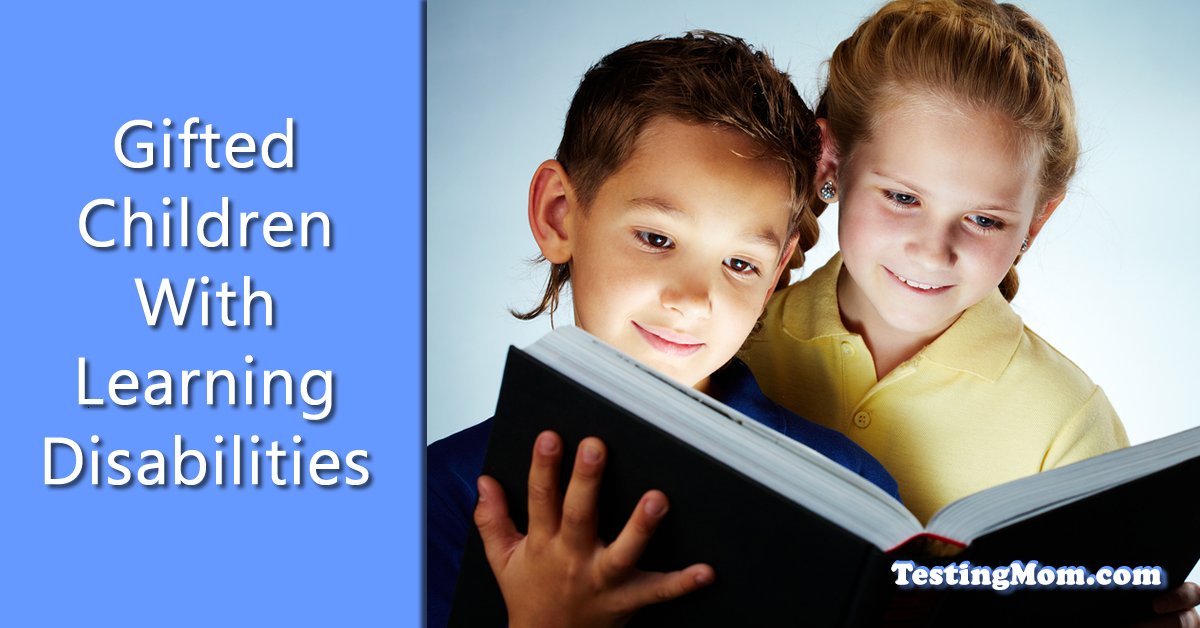› Gifted Children With Learning Disabilities or Twice Exceptional Children
Gifted Children With Learning Disabilities or Twice Exceptional Children
posted by Karen Quinn, The Testing Mom - March 16th, 2016
Often parents hear about gifted kids who also have learning disabilities.
These kids are known as “twice exceptional.” Sometimes their teachers call them “lazy” or “average”.
The teachers don’t recognize the child’s gift because the disability masks or distracts from it. Parents sense that their kids are smart, feel in their gut that their kids are gifted even, but they just, for whatever reason, aren’t performing in school. How can parents better recognize if they have a child in that situation?
First of all, it is important not to accept the term “lazy” if a teacher ever suggests that about your child.
If you stop and look at babies, you’re not going to see any lazy babies. They’re all going to try to walk; they’re all going to try to talk. If your child does not read at the same time as other children, if he doesn’t tie his shoes when other children are tying their shoes, if she’s struggling with mathematics when other kids find it easy, these are not signs of laziness. These are signs of learning issues that need to be further investigated. Very often, learning disabilities, like giftedness, are hereditary. You’ll find either one or the other parent who had difficulty with mathematics or was a late reader or really was very sensitive to labels in their clothing or have poor handwriting, and you’ll find a parent or grandparent who had some of these same issues.
Often, with kids, you have giftedness and learning disabilities together, and they will mask each other.
The scores on an IQ test will end up in the average range because they’re taking the high scores in (say) the child’s abstract reasoning and the low scores in the area of disability, let’s say a verbal problem, and they’re averaging them together. That kind of child wouldn’t qualify for a gifted program. His teachers might not even realize that the child is actually struggling and working harder and putting more hours into learning than other children in the class, which is really frustrating for the child and his parents.
Most often, kids are tested to try to get into a school or a gifted or GATE program.
That is when their hidden learning disability or twice exceptional status is uncovered. It is much more common than you think. If your child is assessed for a school or gifted program and you are told, for example, “He scored in the 70th percentile and didn’t qualify for the gifted program,” you must ask to see his scores broken out. Maybe he scored in the 99th percentile in verbal skills and the 30th percentile in non-verbal skills, and the 80th percentile in math. This is a child who is highly gifted in one area and struggling in another. You will want to know that so you can step in and offer support!
I cannot stress enough how important it is to look at the scores broken out and to understand this concept of twice exceptional children.
When my daughter, Schuyler, was 4.5, she was given an IQ test. All of her verbal scores were 98’s and 99’s. Her visual-spatial reasoning scores were in the 30’s. When all the scores were averaged, Schuyler’s composite score was good enough to get her into the school I wanted her to go to, so I didn’t give the low scores another thought. Had I understood what a red flag those low visual-spatial reasoning scores were, I would have watched for her to have trouble with visual spatial activities and I would have known to jump in with help as soon as that happened. I didn’t understand this, so it wasn’t until 5th grade that she was diagnosed with visual-spatial reasoning disability. In school, she struggled in geometry, geography, sciences (tables and charts) – anything with a visual component caused her trouble. By about 5th grade, school became very difficult for her. Schuyler was a classic twice-exceptional child, but I didn’t understand that until years later. So the point is, if your child is tested, look at all the subtests for clues as to your child’s gifts, and your child’s areas of weakness.
If you had your child tested to try to get her into a gifted program, you may discover that she doesn’t qualify. That’s okay. There was still value in having her take that test. After you see the disparate scores she earned, you as a parent can put together your own program for your child to support the learning issues that cause her to struggle in class while at the same time giving her positive experiences in the areas where she has real potential and a definite gift. This is what we did for Schuyler. We brought in a special tutor to work with her on visual-spatial reasoning as it applied to math and science. At the same time, her exceptional language skills gave her a love of literature and drama. We put her into an acting program where she excelled. Today, she is studying to be an actress and has performed successfully on stage, in movies and on TV.
If your child is struggling in one area, it’s critical to find the place where she can thrive and feel successful.




Tell us about your experiences
One Response
lydiaalalmo65@gmail.com
My grandson could read at the age of three. He could also do puzzles. He knew all the letters and numbers up to 20, but the minute he entered school it all stopped and he is always behind in his work and gets low grades. At home we believe can do better, but I don’t know how to help him.